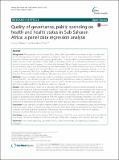Files in this item
Quality of governance, public spending on health and health status in Sub Saharan Africa : a panel data regression analysis
Item metadata
| dc.contributor.author | Makuta, Innocent | |
| dc.contributor.author | O'Hare, Bernadette Ann-Marie | |
| dc.date.accessioned | 2015-09-23T11:10:02Z | |
| dc.date.available | 2015-09-23T11:10:02Z | |
| dc.date.issued | 2015-09-21 | |
| dc.identifier | 217030324 | |
| dc.identifier | b647ead7-f6ff-443b-af04-a0f55b386823 | |
| dc.identifier | 84942042356 | |
| dc.identifier | 000361443300003 | |
| dc.identifier.citation | Makuta , I & O'Hare , B A-M 2015 , ' Quality of governance, public spending on health and health status in Sub Saharan Africa : a panel data regression analysis ' , BMC Public Health , vol. 15 , 932 . https://doi.org/10.1186/s12889-015-2287-z | en |
| dc.identifier.issn | 1471-2458 | |
| dc.identifier.other | ORCID: /0000-0003-1730-7941/work/27345654 | |
| dc.identifier.uri | https://hdl.handle.net/10023/7530 | |
| dc.description.abstract | Background The population in Sub Saharan Africa (SSA) suffers poor health as manifested in high mortality rates and low life expectancy. Economic growth has consistently been shown to be a major determinant of health outcomes. However, even with good economic growth rates, it is not possible to achieve desired improvements in health outcomes. Public spending on health (PSH) has long been viewed as a potential complement to economic growth in improving health. However, the relationship between PSH and health outcomes is inconclusive and this inconclusiveness may, in part, be explained by governance-related factors which mediate the impact of the former on the latter. Little empirical work has been done in this regard on SSA. This paper investigates whether or not the quality of governance (QoG) has a modifying effect on the impact of public health spending on health outcomes, measured by under-five mortality (U5M) and life expectancy at birth (LE), in SSA. Methods Using two staged least squares regression technique on panel data from 43 countries in SSA over the period 1996–2011, we estimated the effect of public spending on health and quality of governance U5M and LE, controlling for GDP per capita and other socio-economic factors. We also interacted PSH and QoG to find out if the latter has a modifying effect on the former’s impact on U5M and LE. Results Public spending on health has a statistically significant impact in improving health outcomes. Its direct elasticity with respect to under-five mortality is between −0.09 and −0.11 while its semi-elasticity with respect to life expectancy is between 0.35 and 0.60. Allowing for indirect effect of PSH spending via interaction with quality of governance, we find that an improvement in QoG enhances the overall impact of PSH. In countries with higher quality of governance, the overall elasticity of PSH with respect to under-five mortality is between −0.17 and −0.19 while in countries with lower quality of governance, it is about −0.09. The corresponding semi elasticities with respect to life expectancy are about 6 in countries with higher QoG and about 3 in countries with lower QoG. Discussion Public spending on health improves health outcomes. Its impact is mediated by quality of governance, having the higher impact on health outcomes in countries with higher quality of governance and lower impact in countries with lower quality of governance. This may be due to increased efficiency in the use of available resources and better allocation of the same as QoG improves. Conclusion Improving QoG would improve health outcomes in SSA. The same increase in PSH is twice as effective in reducing U5M and increasing LE in countries with good QoG when compared with countries with poor QoG. | |
| dc.format.extent | 11 | |
| dc.format.extent | 476999 | |
| dc.language.iso | eng | |
| dc.relation.ispartof | BMC Public Health | en |
| dc.subject | Public health spending | en |
| dc.subject | Sub Saharan Africa | en |
| dc.subject | Under-five mortality | en |
| dc.subject | Life expectancy | en |
| dc.subject | Governance | en |
| dc.subject | Corruption | en |
| dc.subject | RA0421 Public health. Hygiene. Preventive Medicine | en |
| dc.subject | NDAS | en |
| dc.subject | SDG 3 - Good Health and Well-being | en |
| dc.subject.lcc | RA0421 | en |
| dc.title | Quality of governance, public spending on health and health status in Sub Saharan Africa : a panel data regression analysis | en |
| dc.type | Journal article | en |
| dc.contributor.institution | University of St Andrews. School of Medicine | en |
| dc.contributor.institution | University of St Andrews. Global Health Implementation Group | en |
| dc.identifier.doi | 10.1186/s12889-015-2287-z | |
| dc.description.status | Peer reviewed | en |
| dc.identifier.url | http://www.biomedcentral.com/1471-2458/15/932 | en |
This item appears in the following Collection(s)
Items in the St Andrews Research Repository are protected by copyright, with all rights reserved, unless otherwise indicated.

